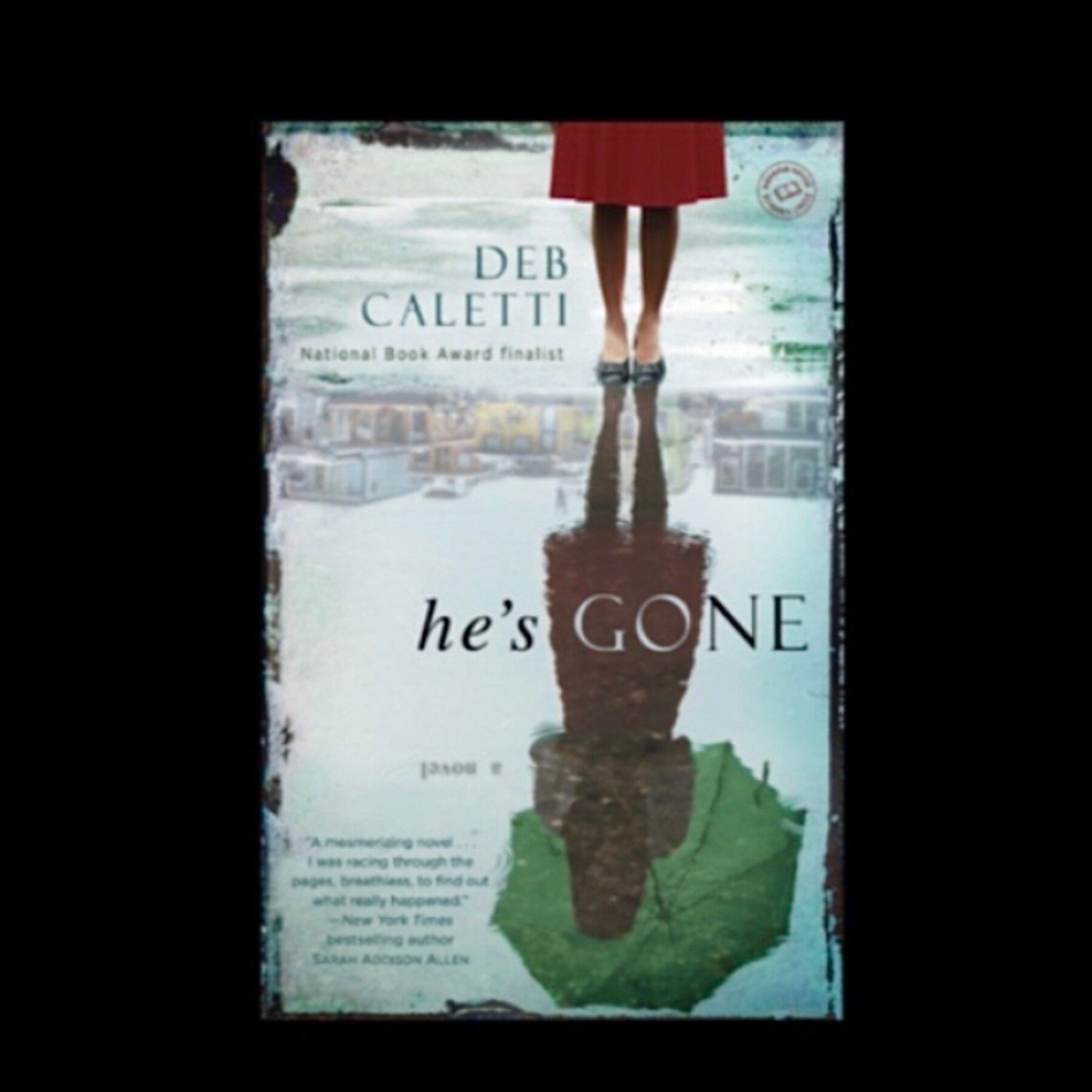
He's Gone
“YA veteran and National Book Award finalist Caletti (The Story of Us, 2012, etc.) makes a striking adult debut with this tale of a husband’s mysterious disappearance. …As Ian’s absence lengthens into weeks, her memories slowly paint a devastating portrait of two damaged people who clutch at each other for rescue but soon discover that their problems are deeper than unsatisfying marriages. …Though the opening pages seem to promise a suspense novel—and the close delivers a well-executed plot twist—this is in essence the story of a woman’s growing self-knowledge, perfectly executed at an appropriately measured pace. Caletti softens the stark message that love doesn’t necessarily change anything with her compassion and understanding for Ian as well as Dani. Well-written, strongly characterized and emotionally complex fiction.”
—Kirkus (starred review)
“Readers will find themselves swept up by the crisis, made palpable by Caletti’s believable characters and their raw emotions. As much a gripping emotional thriller as it is a book about love and relationships, Caletti’s newest work will please old fans and garner new ones.”
—Booklist
“What makes this beautifully-written page turner such a gift is the countless, deftly-offered insights into the subterranean inner workings of a marriage, a mind, a heart. It will make you think about your own secrets–the ones you keep even from yourself, as we all do–and have just a little more courage to look at them. Gripping, honest, illuminating. I couldn’t put it down.”
–Juliette Fay, author of Shelter Me
“Psychologically spot-on, He’s Gone explores the baffling nuances of the choices we make, as light as butterfly wings, but weighing us down with consequences in the end. I was racing through the pages, breathless, to find out what really happened. With He’s Gone, Deb Caletti doesn’t just make a stunning debut into adult fiction, she throws down the gauntlet. It’s a mesmerizing novel.”
–Sarah Addison Allen, New York Times bestselling author of Garden Spells and The Girl Who Chased the Moon
“The mysterious disappearance of a husband serves as the backdrop for a thought-provoking and moving exploration of all the things that can be lost within the boundaries of a marriage. With grace and insight, Caletti digs deep into the needs and misdeeds of individuals as they strive to create lives together.”
–Erica Bauermeister, New York Times bestselling author of The School of Essential Ingredients
“He’s Gone is a masterful mix of gripping, page-turning suspense and a revealing examination of an intense and complicated relationship. Deb Caletti is an author fully in command of her craft, confidently delivering an absolutely unputdownable novel. One of the best books I’ve read all year.”
–Barbara O’Neal, author of The Garden of Happy Endings
“What happened to your husband, Mrs. Keller?”
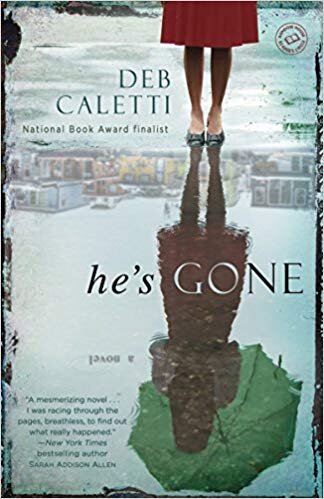
From National Book Award finalist Deb Caletti comes an intensely gripping story about love, loss, marriage, and secrets—perfect for readers of Jodi Picoult, Kristin Hannah, and Anna Quindlen.
The Sunday morning starts like any other, aside from the slight hangover. Dani Keller wakes up on her Seattle houseboat, a headache building behind her eyes from the wine she drank at a party the night before. But on this particular Sunday morning, she’s surprised to see that her husband, Ian, is not home. As the hours pass, Dani fills her day with small things. But still, Ian does not return. Irritation shifts to worry, worry slides almost imperceptibly into panic. And then, like a relentless blackness, the terrible realization hits Dani: He’s gone.
As the police work methodically through all the logical explanations—he’s hurt, he’s run off, he’s been killed—Dani searches frantically for a clue as to whether Ian is in fact dead or alive. And, slowly, she unpacks their relationship, holding each moment up to the light: from its intense, adulterous beginning, to the grandeur of their new love, to the difficulties of forever. She examines all the sins she can—and cannot—remember. As the days pass, Dani will plumb the depths of her conscience, turning over and revealing the darkest of her secrets in order to discover the hard truth—about herself, her husband, and their lives together.

He’s Gone: A Conversation with Deb Caletti
Random House Reader’s Circle: You’ve written many popular teen novels, but He’s Gone is your first novel for adults. What was the inspiration for your adult debut? Did you have the idea long before you began writing it? And how was the writing process different?
Deb Caletti: You never know how—or when—the idea for a book will appear. This one came right when I needed it, shortly after we’d begun discussing the possibility of me writing an adult novel. The inspiration arrived in much the same way that He’s Gone begins. I was lying in bed, trying to determine if my husband was home or not. I was doing that thing you do, where you listen for the sound of footsteps, or the toaster lever being pushed down, or coffee being made. And then, rather handily and helpfully, came the thought: What if you woke up one morning and found that your husband had vanished? The idea of writing the book as a confession came quickly afterward, as did the decision to explore the subjects of guilt and marriage, wrongdoing, and the way those old, treacherous voices from childhood can continue to haunt us. I began work on the book as soon as I could, just after finishing The Story of Us. Sometimes you have an idea that makes you feel like a kid on Halloween night. Can we just skip dinner, so we can go? I wanted to go. I couldn’t wait to start this one.
The writing process wasn’t all that different from my other books. My previous nine young adult novels are full length and fairly complex and character driven, and my readers are already a mixed bag of ages, falling generally in the older teens to adult range. There is always a teen protagonist, but my books also feature adult characters of varying ages—mothers and daughters both struggling with screwed-up love lives, for example, or generations of women with something to say about relationships, family, and identity. I tend to try to push the boundaries of YA, offering more thought-provoking mate- rial than readers of that age might be used to, along with a slower, more literary pace. So writing a book for adults wasn’t a great leap. The only real difference I found was that the boundaries I always try to push didn’t exist anymore. There were no more fences for me to stay in or out of. It was very freeing. I found that, for me, writing within those boundaries is actually in many ways more challenging.
RHRC: He’s Gone takes place in Seattle, where you also live. Do you feel that your life in the city inspired or influenced the novel? If so, how?
D.C.: Setting has always played a huge part in my books, and I have no doubt that’s because I live in such an evocative place. I like to approach setting as if it were character, with a character’s traits and quirks and moods. Seattle—and the San Juan Islands, and the towns of the mountain foothills that I’ve previously written about—all have so much character, it’s hard to cross a street without seeing something to include in a book. We are bombarded with setting here, which is a lucky thing for a writer, I think. It offers itself. He’s Gone primarily takes place in a particularly eccentric and picturesque part of our city—the houseboat community around Lake Union, where I once lived part-time. It seemed an especially fitting setting for the book. First, there is water everywhere, and these characters are, well, literally drowning in guilt. But even more than that, the houseboats and their docks are a little off kilter. Yes, they’re charming and shingled and dripping with gorgeous flowers. Ducks paddle by, and so do friendly kayakers. Sailboats swoop out to the lake on a glorious day. But, too, the houses and boats are rocking and clanging. The old piers sway and creak. On a rainy day, it’s a little spooky. On any day, it’s all slightly deranged.
RHRC: Though the story begins when Ian vanishes, he feels like a fully evolved character by the time we reach the ending. Can you tell us a bit about the challenges of fleshing out a character who is mostly “offscreen”?
D.C.: I like the idea of this, the “off screen” character. I also have one in my book The Story of Us. That character, Janssen Tucker, is totally absent until he appears for his one line at the very end of the book. The idea appeals to me because there are a lot of “offscreen” people in our own lives. You can come to know your partner’s ex or their deceased parent in a very real way, even if you’ve never met them. You can come to have very strong feelings about them, an understanding of them, a full picture, just from what you hear. In writing, the challenge to make a character come alive even when he’s not on the scene is met in the same ways it happens in real life. You hear stories about the person. Your partner tells you about his ex, but so does his best friend, and so does his mother. Maybe you see a photo or hear a rumor. Maybe you hear a voice on an answering machine.
Ian, in He’s Gone, needed to be much closer to the reader than Janssen Tucker did in The Story of Us. Aside from Dani, Ian is the most important character in the book. It’s crucial to feel him right there, even though he’s missing—to feel the press of his control, to even feel his breath on her face during that picnic. He needs to be so well known that we understand both his complicated emotions and the bind those emotions have put Dani in. Dani’s own flashbacks serve this purpose (we actually “see” Ian during those times), but Nathan’s accounts of their relationship flesh out Ian’s character, as do Isabel’s and Abby’s. What we see of his relationship with his children and Mary and especially his father hopefully fill Ian in further. What I also felt helped bring Ian close were the times that Dani heard him speak in her head. That’s about as close in as you can bring someone.
RHRC: Dani has a compelling narrative voice, and it’s easy to take her version of the truth for reality. Ultimately, though, we find out that she’s not a reliable narrator. What made you decide to go this route?
D.C.: I went this route because we are all unreliable narrators, not just in the way we tell our stories to others, but how we tell them to ourselves. Maybe especially how we tell them to ourselves. All of us create our own versions of an event, of our lives, even, not because we’re liars, necessarily, but because we can only see and understand the truth from our own viewpoint, and a shifting viewpoint at that. Facing the truth is a messy business. You’ve got denial, and pride, and the fact that understanding takes time; you’ve got perspective (or lack of it) and the pesky fact that we can only face the truth we can stand to face at any given moment. I didn’t see Dani as being willfully deceitful in the way she tells her story. I saw her as struggling with a hard truth that she hadn’t even entirely admitted to herself yet. It’s one of the toughest human being jobs, I think, being utterly and completely honest with yourself.
RHRC: One aspect of He’s Gone that really stuck with us is the imagery involving butterflies. Can you tell us a bit about the inspiration there?
D.C.: My first marriage was an abusive one, and long after I left it, a very good friend, someone who knew me well, reflected on that time. He said, “You were like a butterfly, caught in a net.” I never forgot those words. Butterflies became personally symbolic to me. I knew I wanted to one day use this symbolism in my writing—the fragility, the strength, the capture, the escape. Because, yes, there is the helplessness of being trapped, but there is also what happens when the butterfly manages to get free.
RHRC: Did you know how He’s Gone would end before you began writing it? If not, can you tell us a bit about some of the other endings you considered, and why you ultimately chose this one?
D.C.: I always say that, for me, writing a book is like a wacky Greyhound bus trip—I know where I’m starting and where I’ll end up, but I have no idea what will happen along the way. He’s Gone was different, though. I didn’t know how the book would end. I struggled with it. I wanted to write the novel as a confession, and so this meant considering the obvious possibility that Dani had indeed harmed Ian. I felt this was the wrong route, though. It would have turned the book into a clichéd abused-woman-kills-husband story, and that felt cheap to me. It would have been a dishonest choice, a disservice, even, to anyone who’d actually been in a similar relationship. In reality, we know who usually ends up being harmed in situations like that, and it isn’t the perpetrator. Perhaps more important, though, in terms of my vision for the book, if Dani had been guilty of harming Ian, the story would have become about a violent act and not about what I wanted it to be about—the complexity and impossibility of assigning guilt; the million gray areas of culpability, which can sit right next to our very black-and-white feelings of shame.
After my father read the book, he handed it back to me and said, “I was really glad she didn’t do it.” And maybe that was the biggest reason that I chose the ending I did. I was really glad she didn’t do it, too.
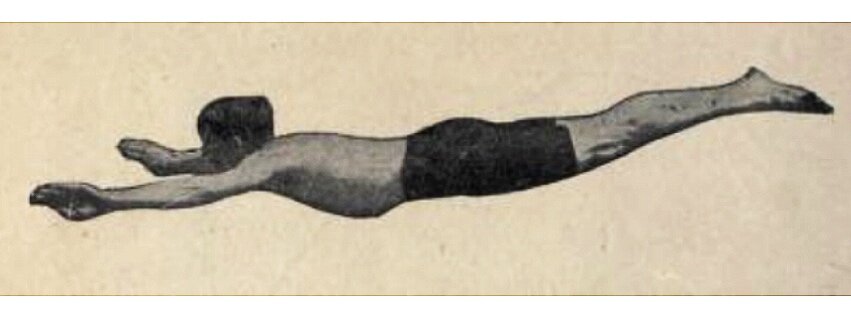
He’s Gone: Evolution of a Loner
If you’re anything like me, as soon as you close the cover of a novel, you’re dying to know what’s true or not true in the book. It’s a question that I – even as the author – can find tricky to answer. For me, the story usually includes bits of actual events, a heavy dash of imagination, and a large dollop of feelings I’ve experienced in the past. All of this goes into the mental blender, and then the subconscious pushes the puree button. In HE’S GONE, though, there’s one scene that’s clearly and completely right out of my own life. It happens in the very beginning of the book, when Dani gleefully realizes that she might be home alone. Dani’s joy on that page is my joy. Oreos on a paper towel for breakfast? Bliss. Tucking back into the covers to read as long as you want? Paradise. And how about Chinese food eaten out of the container all by yourself in the kitchen? Or any meal made up of two slices of bread and something in the middle? And late nights of Netflix and Girl TV that your partner doesn’t even know you watch? Sigh.
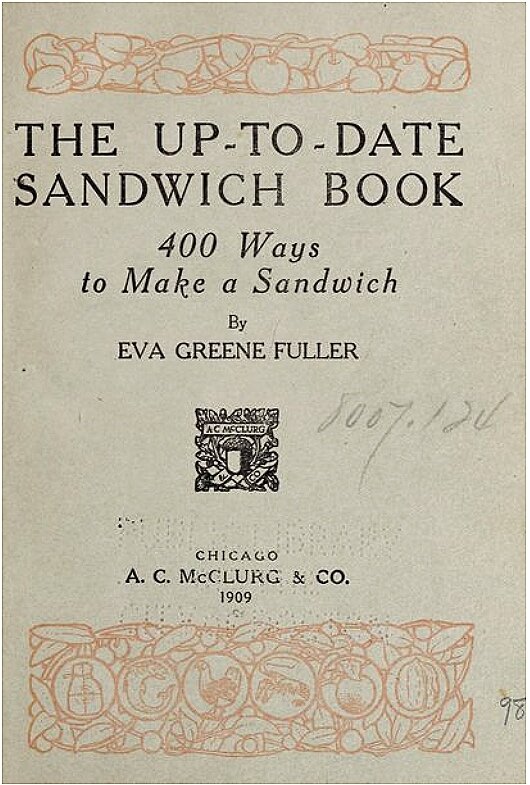
Nature’s Perfect Food
I love it. When my sweet husband says he’s going away to visit his family, I start planning my Beef Week (he’s a vegetarian) and my reading list. I’m as excited as a kid on a Snow Day, as delighted and scheming as when you’ve got birthday money in your wallet. I also need time to myself on a daily basis, and I’ve been lucky to find a profession that sanctions that. But I’ve got a complicated relationship with alone. That’s my confession. I love being alone until I stop loving it. Until I start talking to myself, and even the dog gets tired of Girl TV and dropped bits of chow mien and retreats to his bed with a sigh. Until I find myself chatting way too long to the grocery checker, long enough that the guy behind me who just wants to hurry up and buy his bouquet of apology-flowers starts to get impatient. Even more than that, though, I love it until my happiness at being on my own is misunderstood by others, viewed as a social failing of some sort, or until it makes my beloved feel beside the point.
I blame (or thank) a little nature and a little nurture for my introverted leanings, because I was the same way even as a child. I began a life-long practice of both adoring and
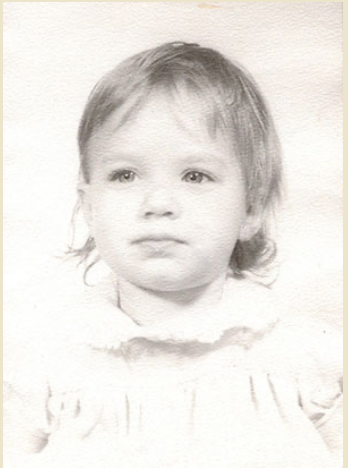
A Loner Is Born
devouring books in the first grade, right after Mrs. Foley read us RAMONA THE PEST, and that’s when the need to be alone really started. Aside from those memorable weeks of sitting still and riveted amongst my squirmy classmates, and aside from the same feeling of being utterly captured when my mother read me CHARLOTTE’S WEB, reading was, of course, a beautiful, solitary activity. And reading became habitual. No, more than habitual – it became a basic necessity, one of the daily essentials required to sustain life, along with food and water.
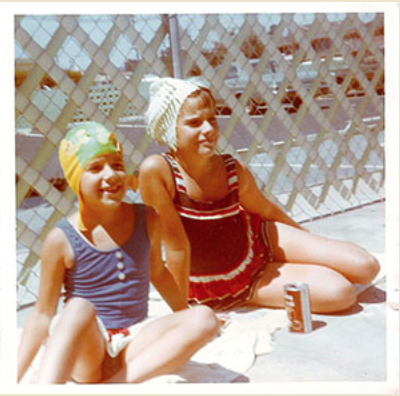
The awkward phase begins. Me and my big sis (who shall remain nameless to protect the innocent.)
Temperamentally, too, I was a reflective child, an awkward kid, an observer (a writer) and books were a place to be understood and to find rest. They were also a place to hide. We moved a lot, every two years or so. Being the new kid in class required a splashy confidence that I lacked, and those ever-changing schools just gave more evidence to the theory that I didn’t fit in. Our home wasn’t always a happy one, either (whose is?), and going to my room to read was a retreat. It was a double-walled fortress – first, the book itself, the flight into another time and place, and then my very own room, with its shut door. It must have been about then that I made this great discovery: being alone meant no external pressure, no expectations, no not meeting expectations. It meant no tension, and no anxiety. It was a relief.
It also was – is – hard for others to understand. Those of us who like our time alone are a bit of a mystery to those who don’t. They’re not sure what to do with us, or how to understand us. Actually, we make people nervous. They think we need help of some kind. They give us lots of names, many of which are ungenerous or at least significantly off the mark. First, there are the labels tinged with suspicion: “loner,” “recluse,” “outsider,” and “outcast” – I’d hide my valuables from any of them. You must be hiding something or plotting to overthrow the government, right, because who likes to be alone? And then there are the descriptions that imply alone equals lonely – words like “solitary” or “private” or “isolated”, which bring to mind images of heated-up frozen dinners and long stares out of windows dripping rain. There are the expressions that try to put a positive spin on things, too, but which still have overtones of the weird and masturbatory: “Liking your own company,” or able to “entertain oneself,” suggesting at the least that one is home alone dancing in front of mirrors. Thankfully, there are other terms that don’t feel so pale or sad or shockingly incapable. These portrayals swing to the other side, imparting upon us a can-do spirit that seems cheery and downright powerful, capable of solo world travel and hacking through forests with machetes. We are independent. We are autonomous. We are self-sufficient.
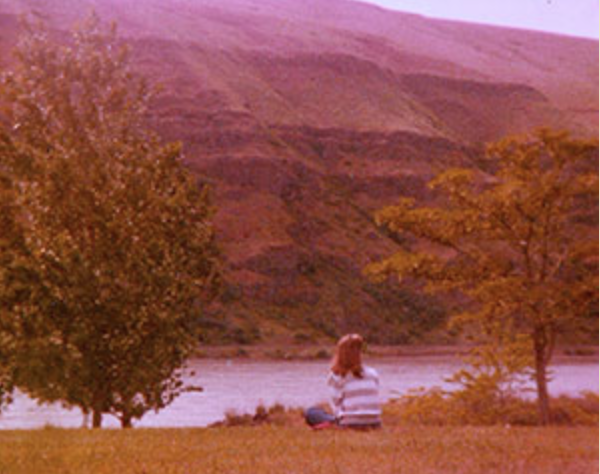
Contemplating, my favorite past-time, just after high school.
We are shy, people think. But I’m not shy. I don’t have social anxiety. I don’t feel particularly nervous or reluctant about get-togethers or gatherings or group events. I can rather shamefully love to be the life of the party. I have myself a great old time at any and all of these occasions, thrilled with good conversation and tiny plates filled with elegant food. Even in high school, I was an active member of school clubs, and I was stage-center in our plays. Later in my life, of course, there were dinners and celebrations and speeches and conferences, and I’ve mightily enjoyed nearly every one. But there was always (and is always) that particular and great moment upon coming home, the one where you put on your robe and shut that blessed door, where it’s just you again, and what you feel most is, “Ahh.”
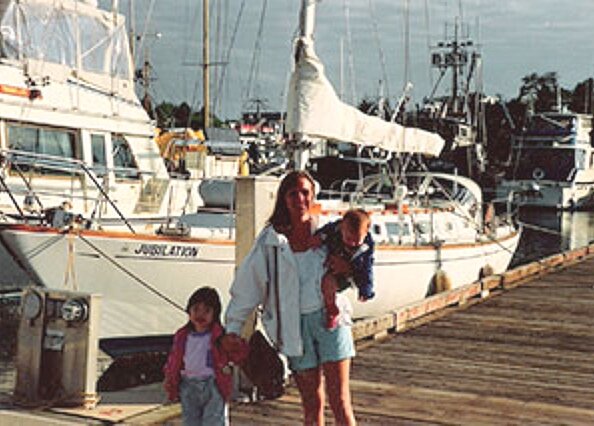
The never-lonely years of tots and high-waisted pants
The biggest and most damaging misconception, though, is that a need for “alone-time” (Another terrible expression. Very preschool-y) means a lack of need for people. A disdain for people, even. But we’ve muddled our facts. You can love dinner without hating dessert. Time spent with all of my beloveds is the most cherished thing in my life. But I desire a deep connection to the people around me. I crave the meaningful interactions that come over the long haul, rather than hit-and-run party chatter. That old introvert cliché, the woman who lives alone with her numerous cats, well, she’s probably not an introvert at all, or is at least not merely an introvert. I, for one, am a dog person. A one-dog woman. I like a walk in the park with someone I care about; I like playful humor, and loving bonds. I treasure my relationships.
Which provides the complication in this continuing, impossible recipe of too much of this, too little of that: How do you merge your need to be alone with your need to be apart? No, wait, worse and more thorny than even that. How does your partnermanage your need to be alone with his need to be with you? Every couple has to find that just-right of closeness and distance, and, like Dani, every person must come to terms with their dependence versus their independence, their fears of alone and not-alone that can make us stay too long in bad places just for the company in the dark. But what about the less monumental issues? What about the daily negotiations that can get prickly for us introverts, even us introverts in (or in my case, finally in) happy partnerships? We can be hard to understand even by those who understand us best.

Retreat to the nearest hiding place.
Distance sits close to withholding. Privacy sits close to detachment. Self reliance can send the message that you’d just as soon not have someone around. I’ve been told on more than one occasion by more than one partner that I don’t make a person feel needed, and we all want to feel needed sometimes. The fact that I am not lonely when I’m alone can wrongly convey that I’m happier that way. It’s not personal, but it can feel personal. Temperament is rather unbudging, and those who love us are required to have an abundance of inner resources and the kind of solid ego that allows them to step back without stepping away.
But, too, there’s the part you play in this conflict. (Damn it. I hate that!) Where they complain about you wanting to be alone, which makes you, ahem, want to be alone. Where the compulsion to be by yourself is not temperament at all, but just your old childhood urge to flee, to be free, to turn the intensity down. To turn the anxieties and requirements and demands off. To get away from anger, or the ways you’re disappointing others. It’s about the reprieve from negotiation, because when you’re with only you, you get your way all the time. Too much feeling can flip the introvert’s switch. Retreat feels critical; there’s a four-alarm fire, and you must get out. Retreat, oftentimes, is a cop-out. Let’s fess up: The need to be alone is part temperament, part coping mechanism. As a temperament issue, your partner probably just has to deal with it. As your preferred method of conflict management, though, you probably do.

Where’d she go NOW?
Time to myself has been vital to me since I was a child, as I’ve said. But it was after I had children of my own that I realized something important about why this need of mine existed at all. The yearning to be alone, I found, did not extend to them, at least not in any but the most regular sort of way, the way every mother with small children feels, when their father goes off to the gym and you hate him for it. Sure, I occasionally envied his lengthy, just-him-and-only-him commute or those business lunches in an actual restaurant, but I never truly desired retreat from my kids. The thing was, I was always myself with my children. And when you’re alone, that’s the very best and most significant thing: All you have to be is yourself. I understood that this was what I most valued in my solitude, and what I longed for and did not always successfully find in my other relationships.
In HE’S GONE, Dani also struggles with this – with her own right to be simply herself. She struggles with using her voice and fighting on her own behalf. I often wonder if those of us who love to be alone are the ones who know this struggle best. Yes, you may
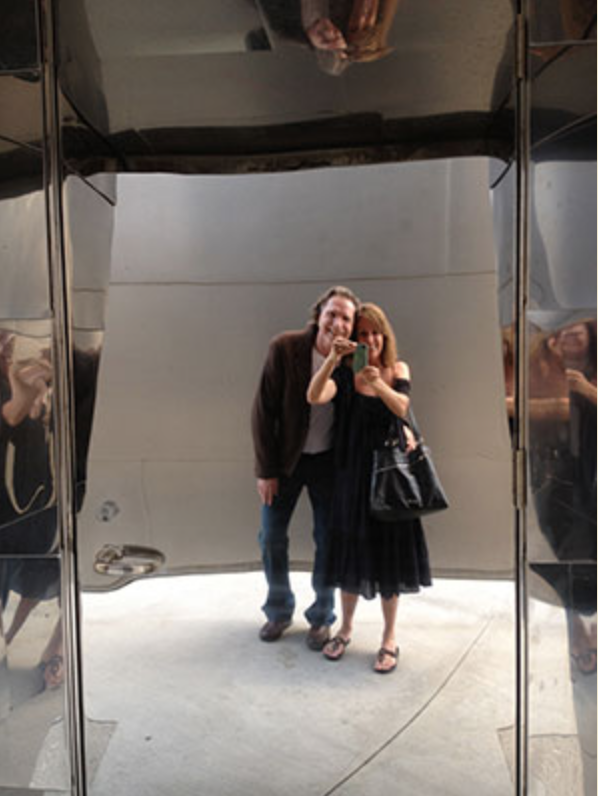
Finding balance with Beloved
be hard-wired for quiet, but, too, it hasn’t always been easy to find peace. You want to sink into the silence and calm that is a lack of struggle. You are, perhaps, a battered, badgered self, that only wants the sweet relief of your own forgiving company.
I, like Dani, am a work in progress on this issue. You might be one, as well. If you are, if you are a loner or an introvert or if you “like your own company,” I wish you the sweet relief you seek. I wish you your own strong voice, and the soft, understanding voices of others. I wish you the freedom to be whoever the hell you are. And I wish you the just-right blend of reaching over in the morning in bed and finding your beloved beside you, or else, reaching over and finding the wide empty space that means Oreos for breakfast.

“Nice is often just powerlessness with a smile.”
